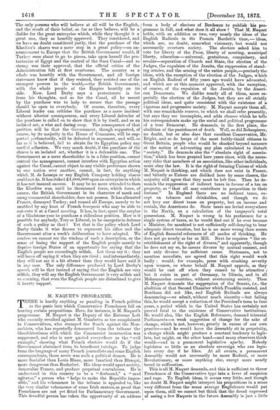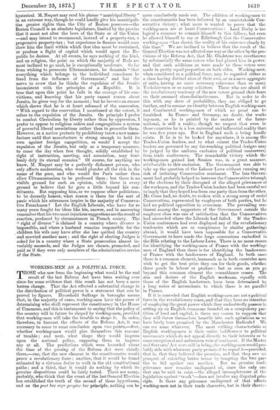M. NAQUET'S PROGRAMME.
THERE is hardly anything so puzzling in French politics as the panic into which Conservative Frenchmen fall on hearing certain propositions. Here, for instance, is M. Naquet's programme. M. Naquet is the Deputy of the Extreme Left who recently revolted against M. Gambetta as too complaisant to Conservatives, who stumped the South against the Mon- archists, who has repeatedly denounced from the tribune the bloodthirstiness with which the Communist insurrection was suppressed, and who is now quoted everywhere as the " evil example," showing what French electors would do if the Government abstained from its beneficent tutelage. To judge from the language of many French journalists and some English correspondents, there never was such a political demon. He is more Socialist than Louis Blanc, more fanatical than Blanqui, more dangerous than Rochefort. His ideas would upset society, demoralise France, and produce perpetual convulsions. He is understood in this country to be a " firebrand," a " mad agitator," a person who " helps to make the Republic impos- sible," and his vehemence in the tribune is appealed to, like the very similar vehemence of some Irish orators, as proof that Frenchmen are not yet fitted for Parliamentary Government. `This dreadful person has taken the opportunity of an address from a body of electors of Bordeaux- to publish his pro- gramme in full, andewhat does it all show ? That M. Naquet holds, with an addition or two, very nearly the ideas of the English Radicals in Sir Francis Burdett's time,— ideas, which are, no doubt, somewhat visionary; but would not necessarily overturn society. The electors asked him to vote for liberty of the Press, liberty of meeting, municipal liberty, education—universal, gratuitous, compulsory, and secular—separation . of Church and State, the election of the Judges, the expulsion of the Jesuits, the suppression of stand-i ing armies, and the arming of the entire people,—precisely the - ideas, with the exception of- the election of the Judges, which an English Radical of fifty years ago would have advocated, and which are at this moment approved, with the exception, of course, of the expulsion- of the Jesuits, by the Ameri- can Democrats. We dislike nearly all of them, more es- pecially the election of the Judges, but -they are all strictly political ideas, and quite consistent with the existence of a vigorous and progressive society. M. Naquet accepts them all, with one remarkable reserve, to which we shall refer presently, but says they are incomplete, and adds clauses which he tells his correspondents make up the social and political programme of a true Democrat. He demands, in the first place, the abolition of the punishment of death. Well, so did Robespierre, no doubt, but so also• does that excellent Conservative, Mr.' Bright, and so do heaps of the most feebly-timid citizens in Great Britain, people who would be shocked beyond measure at the notion of advocating any plan calculated to disturb "society." He demands also the " absolute right of associa- tion," which has been granted here years since, with the neces- sary rider that members of an association, like other individuals, must obey the law. It is the right of forming Unions of which M. Naquet is thinking, and which does not exist in France, and bitterly as Unions are disliked here by some classes, the majority still agree that they must be left free. Then he de- mands the suppression of indirect taxes in favour of a tax on property, so " that. all may contribute in proportion to their fortune." In England there are no indirect taxes, ex- cept on tobacco and drinkables, and though we do not levy our direct taxes on property, but on income and rentals, the Americans do. State taxes are levied everywhere in the North, on a calculation of the taxpayer's total possessions. M. Naquet is wrong in his preference for a single system of taxes; as he would find out if he ever became a Minister, for mankind is not sufficiently self-denying to bear adequate direct taxation, but he is no more wrong than scores of English financial reformers of all modes of thinking. He does not go nearly as far as Mill. Next he requires " the re- establishment of the right of divorce," and apparently, though he does not say so, he means divorce by mutual consent, and not only divorce for sufficient cause. Statesmen, not to mention moralists, are agreed that this right would work badly ; would, for example, press with crushing , severity upon women, on whose behalf M. Naquet appeals, as they would be cast off when they ceased to be attractive ; but it exists in part of Germany, in Illinois, and in all Mohammedan countries, without overturning society. Then M. Naquet demands the supprejsion of the Senate, i.e., the abolition of that Second Chamber which Franklin resisted, and Bentham did not like, and English Radicals are always denouncing—we admit, without much sincerity—but failing this, he would accept a reduction of the President's term to four years, a period which in the United States has certainly not proved fatal to the- existence of Conservative institutions. He would also, like the English Reformers, demand triennial Parliaments—a weak suggestion of change for the sake of change, which is not, however, greatly in excess of our own practice—and he would have the Assembly sit in perpetuity, a change which might produce a constant tendency to legis- late, but might, on the other hand—and many observers think would—end in a permanent legislative apathy. Nobody legislates so little as an absolute sovereign who can legis- late every day if he likes. At all events, a permanent Assembly would not necessarily be more Radical, or more Revolutionary, or more anything else, except more nearly bored to suffocation.
This is all M. Naquet demands, and this is sufficient to throw Frenchmen of the Conservative type into a fever of suspicion and rage. To English ideas, it seems very little, and though no doubt M. Naquet might interpret his propositions in a sense very different from the sense average Englishmen would put upon them, still we cannot but think that the dread expressed of seeing a few Naquets in the future Assembly is just a little
hysterical. M. Naquet may read his phrase " municipal liberty " in an extreme way, though he could hardly give his municipali- ties greater rights than the City of Boston possesses—the
Boston Council is an absolute legislature, limited by the proviso that it must not alter the laws of the State or of the Union —and-may intend to recommend, instead of a property-tax, a progressive property-tax ; but experience in finance would soon show him the limit within which that idea must be restrained, or produce a flight of capital which would upset the Re- public he desires. At all events, he says nothing of the kind, and on religion, the point on which the majority of Reds are most inclined to go mad, he is exceptionally moderate. So far from wishing to persecute Ultramontanes, he demands " that everything which belongs to the individual conscience be freed from the influence of Government," and has the nerve to avow that he thinks the expulsion of the Jesuits
inconsistent with the principles of a Republic. It is true that upon this point he fails in the courage of his con- victions' and knowing that his party cannot reason about Jesuits, he gives way for the moment ; but he invents an excuse which shows that he is at heart ashamed of the concession. " With regard to the reservation I mentioned at the outset, it refers to the expulsion of the Jesuits. On principle I prefer to combat Clericalism by liberty rather than by oppression, I prefer to oppose to religious orders and congregations a system of powerful liberal associations rather than to proscribe them. However, as a nation protects by prohibitory taxes a new manu- facture until that manufacture is strong enough to hold its
own ainst foreign competition, so would I accept the expulsion of the Jesuits, but only as a temporary measure, to cease the day when free thought, solidly established by right of instruction, meeting, and association, may fear- lessly defy its eternal enemies." Of course, for anything we know, M. Naquet may be a perfectly dishonest person, who only ;ffects moderation, who would plunder all the rich in the name of the •poor, and who would fire Paris rather than allow Ultramontanism to be professed there ; but there is no visible ground for such an opinion, while there is every ground to believe that he goes a little beyond his con- stituents. But supposing him, as we suppose other politicians, to be decently honest, what reason is there for the sort of panic which his utterances inspire in the majority of Conserva- tive Frenchmen ? Let the English Liberals, who have for so many years fought for ideas like his, answer, and in answering remember that his twomost injurious suggestions are the result of reaction, produced by circumstances in French society. The " right of divorce " is claimed in a country where divorce is impossible, and where a husband remains responsible for the _ children his wife may have after she has quitted the country and, married another man • and the right of electing Judges is asked for in a country where a State prosecution almost in- variably succeeds, and the Judges are chosen, promoted, and paid as if they were only members of the administrative service of the State.



































 Previous page
Previous page